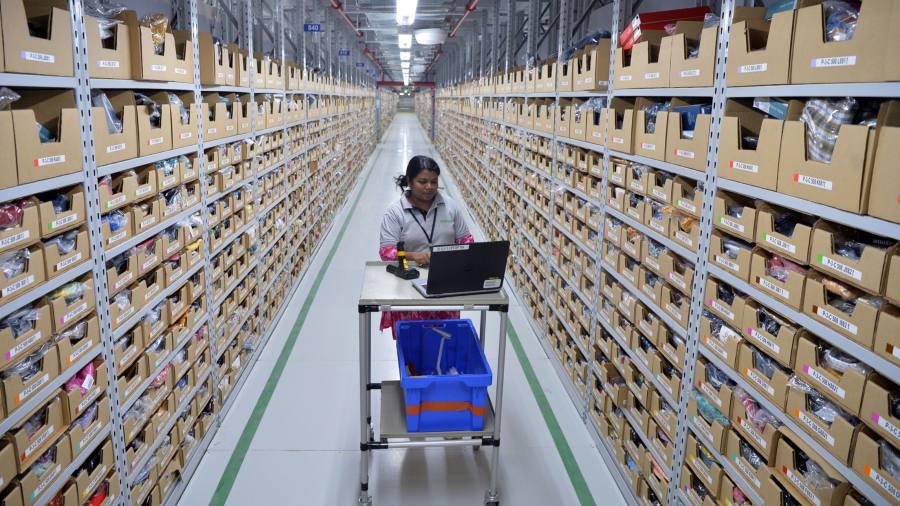[ad_1]
India is preparing to launch a government-backed ecommerce initiative to “democratise” online shopping, in an ambitious attempt to challenge the dominance of companies such as Amazon and Walmart-owned Flipkart in one of the world’s fastest-growing markets.
Open Network for Digital Commerce, a non-profit company set up by India’s commerce ministry last year, is holding trials in more than 85 cities including the tech hub of Bangalore, ahead of a nationwide launch next year.
While companies such as Amazon run proprietary services controlling everything from vendor registration and delivery to customer experience, ONDC is an “interoperable” network, where buyers and sellers can transact regardless of the apps or services they are using.
The open-source network would allow a customer using one app, such as fintech services provider Paytm, to find and order groceries from a vendor registered to another platform, such as small business hub eSamudaay. This can then be shipped by whichever alternative platform, such as delivery service Dunzo, that is able to do it at the fastest and lowest rate.
Indian authorities argue that opening up transactions across platforms in this way will create a vastly larger pool of sellers and consumers and result in lower costs and turbocharged ecommerce growth in the country of 1.4bn. They point to the success of mobile payments network UPI, developed in 2016, as a blueprint.
Thampy Koshy, ONDC’s chief executive, also says it can provide an alternative to the oligopolistic tendencies of large ecommerce platforms, at a time when authorities around the world are looking to curb the power of Big Tech.
“Commerce across the world has grown as walled gardens,” he said. “That has created serious concerns for developed and developing markets.” With ONDC, “everybody will have to compete on what they have to offer, not the captive user base that they have”.
India has about 200mn ecommerce users, according to investment bank Jefferies, and international and domestic ecommerce companies have invested billions of dollars to grow their platforms there.
Yet the sector remains concentrated in relatively affluent urban pockets, with only 0.1 per cent of the country’s 12mn retail outlets “digitally enabled”, Jefferies said. Authorities say the barriers to entry remain too high for small businesses, which are losing market share to large ecommerce players as a result.
Indian authorities see correcting this as part of a wider push to grow the country’s digital economy through tools such as UPI and ONDC. UPI transactions have swelled to more than 7bn a month as cash-based businesses begin switching to digital money.
The authorities hope that ONDC can encourage brick-and-mortar shops to sell online. It has raised Rs1.8bn ($22mn) from a series of investors including the government-run State Bank of India and private lenders such as Kotak Mahindra Bank.
But analysts say making ONDC work will prove far more challenging. “The problem with this is UPI is the movement of money from one digital wallet to another,” said Satish Meena, an independent analyst. “In this case, it’s physical goods. This is very difficult to execute on the ground.”
Trials have run into difficulties, according to local media reports, with users in cities including Bangalore complaining of cancellations, delays and catalogue mix-ups.
Meena was also sceptical that ONDC would break up oligopolies, pointing out that tech giants such as Google and Walmart-owned PhonePe now dominate UPI transaction market share.
Not everyone is on board with ONDC. While Paytm has joined, Amazon and Flipkart are not yet live on the platform, though they have publicly indicated that they will join.
Koshy acknowledged that the largest ecommerce companies “will take a slightly longer time” to sign up as they weigh the pros and cons of participating.
But he added that other difficulties, such as those in the trials, would be ironed out. “It could change the whole supply chain,” he said. “There’s no reason why it should not work.”
[ad_2]
Image and article originally from www.ft.com. Read the original article here.

